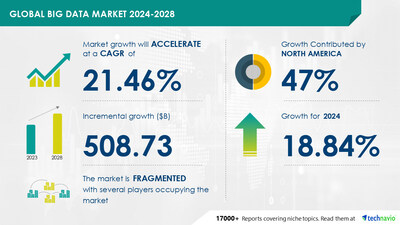A new report from Technavio forecasts explosive growth in the global big data market, projecting a £400 billion expansion between 2024 and 2028. This significant increase, representing a compound annual growth rate (CAGR) of approximately 21.46%, is primarily attributed to the ever-increasing volume of data generation fuelled by ongoing digital transformation. However, the report also highlights the rising concern surrounding data security as a key challenge for the industry.
Technavio's analysis indicates a robust market already exhibiting strong momentum, with year-on-year growth between 2022 and 2023 reaching 18.84%. This upward trajectory is expected to continue, driven by factors such as the increasing adoption of blockchain technologies within big data implementations. Blockchain's inherent security features offer a compelling solution to address the growing data security concerns plaguing the industry.
The report segments the market across various parameters, including deployment (on-premises, cloud-based, and hybrid), type (services and software), and geography (North America, Europe, Asia-Pacific, South America, and the Middle East and Africa). North America currently dominates the market, accounting for 47% of the total, with key contributors including the US, Canada, China, the UK, and Germany.
The market's fragmented nature presents both opportunities and challenges. A diverse range of key players, including industry giants like Accenture Plc, Alphabet Inc., Amazon.com Inc., Microsoft Corp., and Oracle Corp., alongside numerous smaller specialists, compete for market share. This competitive landscape encourages innovation but also necessitates strategic differentiation and robust responses to evolving security threats.
The integration of artificial intelligence (AI) is a pivotal factor shaping market trends. AI-powered analytics platforms are transforming how businesses utilise big data, enabling real-time processing, advanced analytics, and ultimately, more informed decision-making. This extends across numerous sectors, impacting operations, customer experience, risk management, and strategic planning within industries such as healthcare, finance, retail, and energy. Furthermore, advancements in quantum computing and hardware are poised to further enhance data processing capabilities, unlocking new opportunities and accelerating the market's growth.
However, the report acknowledges significant challenges. The sheer volume of data generated, particularly through the Internet of Things (IoT), presents a considerable hurdle for existing security infrastructures. Companies face the ongoing challenge of safeguarding sensitive information whilst managing the ever-increasing data streams necessary for effective big data analysis. The need for robust and scalable security solutions is therefore paramount.
The report details various applications of big data across different industries. For example, companies like Shell International B.V. are already leveraging digital sensors and big data analytics to optimize operational processes. This highlights the real-world impact of big data and the associated opportunities for improved efficiency and cost savings. However, the report stresses the necessity for user-friendly interfaces and readily accessible business intelligence solutions to fully leverage the potential of big data, making complex data analysis accessible to a wider range of users. The importance of data protection and privacy in this context cannot be overstated, given the increasing sensitivity of the data being collected and processed.
In conclusion, the big data market is experiencing a period of rapid and sustained growth, driven by the increasing volume of data and the transformative potential of AI. While security concerns remain a significant challenge, the industry's robust innovation and the expanding range of applications across multiple sectors suggest a bright future for the market, with substantial opportunities for both established players and emerging businesses alike. The report strongly suggests that proactive engagement with AI-driven solutions and a robust focus on data security will be crucial for success in this rapidly evolving landscape.
Article
Business

Big Data Boom: £400bn Market Growth Predicted, Driven by AI

